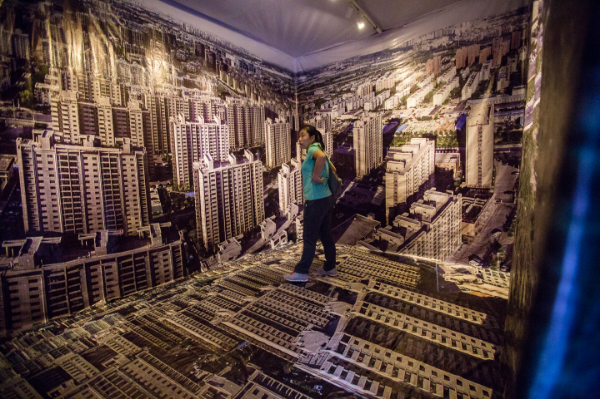Sensorium.Works Develops New Media to Stir Civic Engagement Around the World
Matthew Niederhauser and John Fitzgerald travel the world to research sustainable urban planning for future megacities. The duo presents their research in a decidedly unique way. Through their creative studio, Sensorium.Works, Niederhauser and Fitzgerald collaborate with Columbia University GSAPP's Studio-X, to produce interdisciplinary projects such as films, exhibitions, interactive websites, mobile apps and virtual reality content that explore the sustainability of cities like Beijing, Mumbai, Rio de Janeiro and Johannesburg. This month, Niederhauser and Fitzgerald exhibited simultaneous shows in Studio-X locations, Beijing and Rio de Janeiro, aimed to stir dialogue around the impact of Chinese commercial development on civic communities.
As part of Beijing Design Week, Dashilar Polarized juxtaposed the dense but crumbling urban fabric of the hutong neighborhood Dashilar with the highrise Jiugong Project, where Dashilar residents are accepting compensation packages from developers to move out of their homes.
Despite Dashilar’s historic past and cultural significance, the neighborhood’s immediate future remains uncertain. Few resources have been allocated to ensure the redevelopment of Dashilar respects the heritage and community of long-term residents. Currently, these residents are scattering through-out Beijing, seeking better living situations elsewhere. Niederhauser and Fitzgerald’s installation creates dialogue around the potential redevelopment of Dashilar and the consequences of that redevelopment. Hopefully, Dashilar will avoid falling into such disrepair that the neighborhood is razed and redeveloped from scratch. Otherwise this unique piece of Beijing’s history and urban fabric will become another of a number of consumer-driven, automobile dependent, residential-megablock neighborhoods manifesting across China.
Viewers immersed themselves in Dashilar Polarized during Beijing Design Week. Photo: Matthew Niederhauser
Niederhauser and Fitzgerald’s photography installation, Counterfeit Paradises, will be showing in Rio de Janeiro through October 12. Counterfeit Paradises examines similar themes as Dashilar Polorized, namely the rapid, unrelenting modernization and development of China’s cities. Despite the pollution, relentless traffic, and corruption accompanying the build-up and expansion of Chinese cities, municipal governments and developers continue to prioritize short-term economic growth over long-term sustainability. Counterfeit Paradises employs photography to critically analyze emerging consumer paradigms essential to contemporary China’s developmental practices, be they newfangled municipal districts, communist heritage sites, amusements parks, cultural institutions or themed luxury residential developments.
Counterfeit Paradises sheds light on the rapid development of Chinese cities for viewers in Rio de Janeiro. Photo: Matthew Niederhauser
Now that they have returned to NEW INC, Niederhauser and Fitzgerald will apply their observations into the development of a mobile app which aims to empower local communities in participatory urban design. Given the rampant collusion and lack of transparency in urban planning, the app will also serve as a tool of community organizing and civic empowerment. Citizens will be able to “react to and report on [their] city in regards to design, accessibility [and] resilience,” Niederhauser explains. For Sensorium.Works, smartphones have the capacity to ensure municipal projects are beneficial to the city and reactive to needs of constituents.
To learn more on about Sensorium.Works, check out this audio interview.


